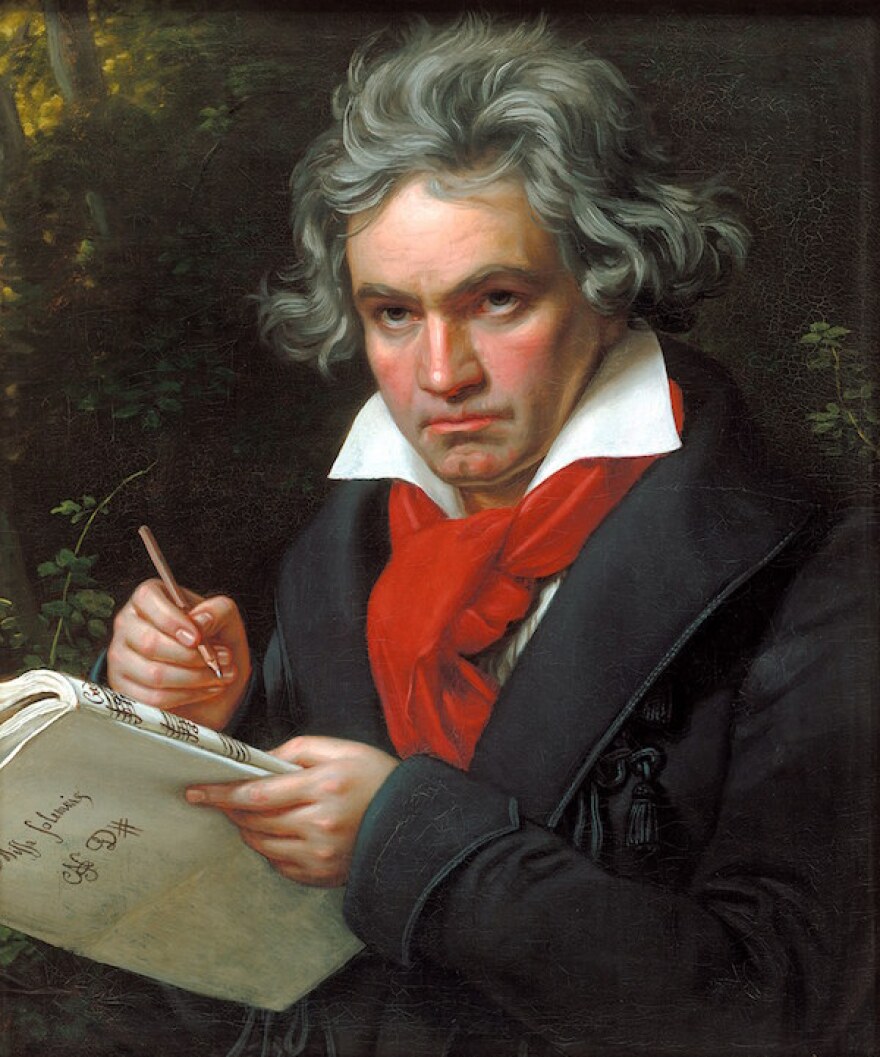Beethoven only wrote one opera, "Fidelio..." or so the story goes. The full story behind Beethoven's opera is more complex. This week on Sunday Night at the Opera, join Chris Voss for that story, and the opera that became "Fidelio" - the original Beethoven opera masterpiece, "Leonore."
Ludwig van Beethoven: Leonore
Leonore: Edda Moser
Florestan: Richard Cassilly
Marzelline: Helen Donath
Jaquino: Eberhard Büchner
Don Pizarro: Theo Adam
Don Fernando: Hermann Christian Polster
First Prisoner: Reiner Goldberg
Second Prisoner: Siegfried Lorenz
Staatskapelle Dresden, The Leipzig Radio Choir
Herbert Blomstedt, conductor
Many composers solidified their place in music history through writing operas. Sure, Vivaldi is remembered today for his concerti, but in his day, his very popular 90-plus operas were what made him a household name. Mozart, brilliant child prodigy that he was, was not in high demand because of his virtuosity as a pianist or a violinist, nor for his 41 symphonies. Mozart was loved for his operas.
But Beethoven? Not so much. For him, opera never came easily. He only managed one, Leonore, or Marital Fidelity, later know as Fidelio.
Beethoven's Leonore was inspired by the French libretto by Nicolas Bouilly "Léonore ou L'amour conjugal." He loved the idyllic portrayal of martial devotion - the Spanish noblewoman (Leonore) who disguises herself as a prison errand-boy named Fidelio, and through this disguise gets access to the fortress where her political-prisoner husband Florestan is in chains, using her cunning and the power of love to rescue him - and set about composing the opera in 1803. By 1805 it was complete: three acts, cleverly mixing French opéra comique, German singspiel, traditional folk song, and "salvation opera," and imbuing it all with that heroic Beethoven energy.
It was a masterpiece.
Unfortunately for Beethoven, the Viennese aristocracy and the Imperial court - those patrons on whose generosity Beethoven's livelihood depended - were not there to hear the first performance on November 20, 1805. They had fled Vienna two weeks prior, ahead of Napoleon's then seemingly-unstoppable army. So, instead of an audience of friendly Viennese ears, Beethoven had a half-full room of mostly French army officers, disinclined to love a work by "the enemy." Not surprisingly, they found Leonore lacking.
So, Leonore was shelved, then heavily reworked, and eventually reappeared almost a decade later, in 1814. By this point Beethoven had gradually begun to recede into himself; he was more jaded, increasingly hard of hearing, more troubled. The version of Leonore that emerged in 1814 was a mirror of this older Beethoven. It was a less linear storyline; had a new title, Fidelio; was one act shorter with re-ordered music; and had a brand new overture (see below). As Beethoven himself described, "almost no musical piece remained the same and more than half of the opera had been completely re-worked."
It was a huge hit in Vienna.
To this day, this final 1814 version of the opera is more often performed than the earlier one, billed as being the more refined, purer version of Leonore - Beethoven's final wish. But there are indications that Beethoven really didn't like the final version all that much. "[This] opera will earn me a martyr's crown," he exclaimed to a friend in a letter, with frustration.
So, instead of shorter, truncated Fidelio, this week on Sunday Night at the Opera, we present the first version of Beethoven's "only" opera, the original masterpiece - Leonore.
Hear more of the music from Leonore.
Read a synopsis of the story.*
Read more on the differences between Leonore and Fidelio.
THE OVERTURES
Beethoven, as music critic Herbert Glass puts it, "spent more time writing the overture to [Leonore] than Rossini and Donizetti spent on entire operas, overtures included." In all Beethoven wrote three Leonore overtures, and then one more for Fidelio. The Leonore overtures, to varying degrees of intensity and complexity, all reflect themes from the opera. The Fidelio overture, on the other hand, stands alone, much shorter than its predecessors and indicative of the celebratory mood in Vienna in 1813, after Napoleon's retreat from Vienna.
Leonore I
https://www.youtube.com/watch?v=zCI7_7RsuM0
Leonore II (this is the one we'll hear in the opera broadcast)
https://www.youtube.com/watch?v=rXF0KK9hQAI
Leonore III
https://www.youtube.com/watch?v=vWWP4WdUgLw
Fidelio Overture
https://www.youtube.com/watch?v=QmpJkIiFEGk
ALSO ON THE PROGRAM
LUDWIG VAN BEETHOVEN: Leonore Overture No. 3, Op. 72b
New York Philharmonic
Leonard Bernstein, conductor
*Note: this is a synopsis for Fidelio, not Leonore.



